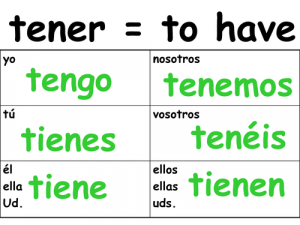Difference between revisions of "Language/Spanish/Grammar/Tener"
Jump to navigation
Jump to search
m (Quick edit) |
|||
| Line 33: | Line 33: | ||
*Tengo que estudiar | *Tengo que estudiar | ||
<blockquote>I have to study</blockquote> | <blockquote>I have to study</blockquote> | ||
==Related Lessons== | |||
* [[Language/Spanish/Grammar/Sentense-Structure|Sentense Structure]] | |||
* [[Language/Spanish/Grammar/Conditional-Mood|Conditional Mood]] | |||
* [[Language/Spanish/Grammar/Por-vs-Para|Por vs Para]] | |||
* [[Language/Spanish/Grammar/Negation|Negation]] | |||
* [[Language/Spanish/Grammar/Prepositions|Prepositions]] | |||
* [[Language/Spanish/Grammar/How-to-conjugate-in-spanish|How to conjugate in spanish]] | |||
* [[Language/Spanish/Grammar/Future-Tense|Future Tense]] | |||
* [[Language/Spanish/Grammar/Use-of-verb-Haber|Use of verb Haber]] | |||
* [[Language/Spanish/Grammar/Be-Polite|Be Polite]] | |||
* [[Language/Spanish/Grammar/The-word-that-cannot-be-written|The word that cannot be written]] | |||
Revision as of 16:33, 26 February 2023
The use of "Tener" (to have)
Use of "Tener" to express feelings or sensations
In English, we use TO BE + ADJECTIVE:
- Tengo hambre
I'm hungry
It's less common to say:
Estoy hambriento(like in English).
In Spanish we use TENER + NAME:
- Tengo frío
I'm cold
- Tengo sueño
I'm sleepy
Use of "Tener" to say your age
- In English, they use "to be": I'm 22 (years old).
- In Spanish, we say "Tengo 20 (años)".
Use of "Tener" to express possession
- Tengo una casa
I have a house
Use of "Tener" to manifest obligation
- Tengo que estudiar
I have to study
